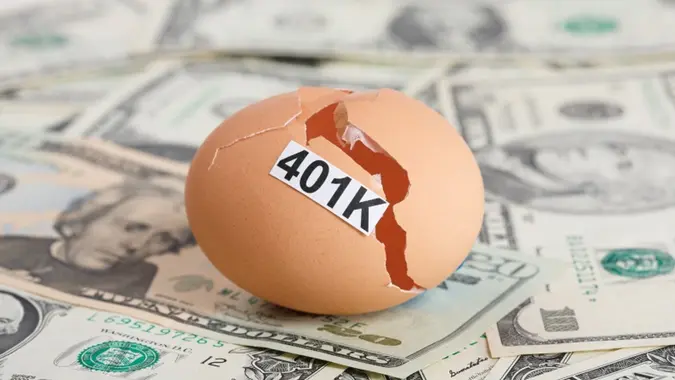4 Reasons Why You Shouldn’t Check your 401(k) Balance as Trump’s Tariffs Take Effect

Commitment to Our Readers
GOBankingRates' editorial team is committed to bringing you unbiased reviews and information. We use data-driven methodologies to evaluate financial products and services - our reviews and ratings are not influenced by advertisers. You can read more about our editorial guidelines and our products and services review methodology.

20 Years
Helping You Live Richer

Reviewed
by Experts

Trusted by
Millions of Readers
Market volatility can be unsettling, especially during a time of government transition. President Donald Trump informed the American people that as a part of making America great again, he would implement tariffs on countries who have not historically treated America favorably. Such a shift in government policies with a global impact can create financial uncertainty.
When the future economic conditions are difficult to project, it increases the impact of unknown variables, which causes businesses, governmental officials and ultimately individual investors to navigate financially without a clear picture. For individuals, watching their 401(k) portfolios fluctuate drastically can be quite unsettling.
Here are four reasons why you shouldn’t check your 401(k) balances as the Trump tariffs take effect.
We Don’t Know the Full Impact of Tariffs Yet
Tariffs are taxes paid by companies who seek to import goods internationally. They can only be levied on products, not services. Because the Trump administration is using the threat of tariffs as a form of negotiation to position America more favorably, the effective date and actual percentage continues to shift. This uncertainty can create volatility in the short term but will eventually resolve itself. Checking the stock market consistently only contributes to the underlying anxiety.
You are Systematically Investing
Based on the design of a company sponsored retirement plan, which allows an employee to contribute a certain dollar amount or percentage of their salary each pay period, employees are saving regularly. The two primary benefits to systematic investing are that it’s a long-term investment and the employees have the benefit of dollar cost averaging into a mutual fund. They are purchasing additional investments consistently to build wealth over time. This strategy does not change based on current market conditions. Therefore, unless you are set to retire soon, you have the benefit of participating in the market during the volatility in a dispassionate manner that can ultimately benefit you in the long term.
You Have Limited Access to Funds
Saving for retirement is a long-term goal. While it may be natural for someone nearing retirement to be concerned, also consider this reality. Even if someone retired at the normal (AKA: full) retirement age, modest social security projections indicate retirees can live well into their early 80s. So, while you may be inclined to adjust as you near retirement, you should not anticipate that you will liquidate and withdraw your entire 401(k) portfolio at age 59 ½.
The Stock Market Will Adjust Accordingly
Even if tariffs are levied against publicly traded companies, they will make the necessary adjustments to ultimately remain profitable and attractive to their shareholders. The goal of a company is to generate profits and increase the stock price of the company to maximize their shareholder’s value. Their fiduciary obligation is to their shareholders who made financial investments into the company. Therefore, the business decisions they make will fully consider the impact any tariffs will have on the overall company value.
Don’t Forget To Trust the Experts
The best way to navigate through uncertain economic times is to sit with a financial planner who can take into consideration your specific goals, objectives and overall risk tolerance. Market uncertainty can be quite scary. However, working with someone who understands your anxiety and is clear about your ultimate objectives, will help you to avoid making hasty decisions that can have a long term, negative impact on your overall financial picture. Taking a moment to critically assess how the current market conditions can impact your future is important. It will help you to better understand that this too shall pass.
Editor’s note on political coverage: GOBankingRates is nonpartisan and strives to cover all aspects of the economy objectively and present balanced reports on politically focused finance stories. You can find more coverage of this topic on GOBankingRates.com.
 Written by
Written by  Edited by
Edited by 

























